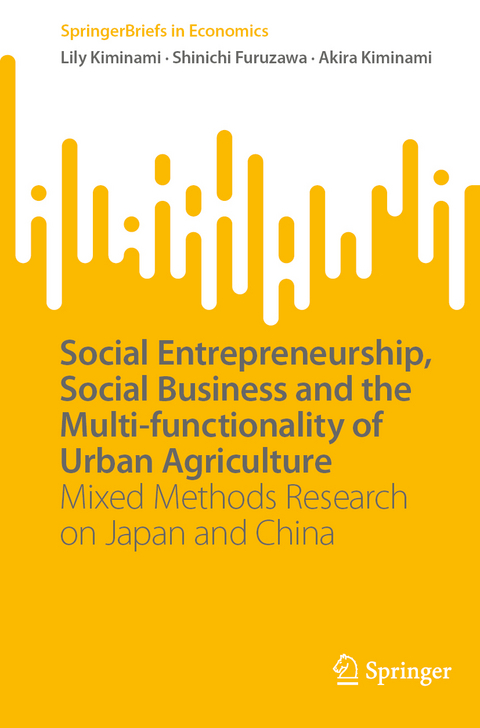
Social Entrepreneurship, Social Business and the Multi-functionality of Urban Agriculture
Mixed Methods Research on Japan and China
Seiten
2022
|
1st ed. 2022
Springer Verlag, Singapore
978-981-19-1761-5 (ISBN)
Springer Verlag, Singapore
978-981-19-1761-5 (ISBN)
This is the first book to clarify the relationships between multi-functions of urban agriculture, creative classes, and social business in China and Japan. Specifically, it constructs a new framework showing how these factors contribute to the sustainability of cities by introducing the mixed methods research of structural equation modeling and the trajectory equifinality model. Policy implications drawn from the research suggests that governments should provide opportunities to create a virtuous cycle to improve the accumulation of social capital in order to attract those who think creatively.
It is widely agreed that a sustainable city should meet the needs of the present generation without sacrificing the ability of future generations to meet their own needs. However, there has been no completely agreed-upon definition for what a sustainable city should be nor upon the paradigm for what components should be included. On the other hand, there is a possibility that the multi-functions of urban agriculture may attract especially those who are thinking creatively. These creative thinkers have a high level of social capital, pay attention to social issues, and are greatly motivated to find solutions through social enterprises such as agriculture-related business.
It is widely agreed that a sustainable city should meet the needs of the present generation without sacrificing the ability of future generations to meet their own needs. However, there has been no completely agreed-upon definition for what a sustainable city should be nor upon the paradigm for what components should be included. On the other hand, there is a possibility that the multi-functions of urban agriculture may attract especially those who are thinking creatively. These creative thinkers have a high level of social capital, pay attention to social issues, and are greatly motivated to find solutions through social enterprises such as agriculture-related business.
Lily Kiminami, Niigata University Shinichi Furuzawa, Niigata University Akira Kiminami, The University of Tokyo
Chapter 1. Introduction.- Chapter 2. Literature Review on CC, SC, SE, SB and MFUA.- Chapter 3. Situation of Urban Agriculture in China and Japan.- Chapter 4. Theoretical Framework, Hypothesis and Methodology.- Chapter 5. Hypothesis Verification.- Chapter 6. Conclusion and Policy Implication.
| Erscheinungsdatum | 26.04.2022 |
|---|---|
| Reihe/Serie | SpringerBriefs in Economics |
| Zusatzinfo | 3 Illustrations, color; 22 Illustrations, black and white; XV, 99 p. 25 illus., 3 illus. in color. |
| Verlagsort | Singapore |
| Sprache | englisch |
| Maße | 155 x 235 mm |
| Themenwelt | Sozialwissenschaften ► Politik / Verwaltung ► Staat / Verwaltung |
| Sozialwissenschaften ► Soziologie ► Spezielle Soziologien | |
| Wirtschaft ► Volkswirtschaftslehre ► Wirtschaftspolitik | |
| Weitere Fachgebiete ► Land- / Forstwirtschaft / Fischerei | |
| Schlagworte | China • Creative Class • Japan • Multi-functions of Urban Agriculture • Social Business • Social capital • Social Entrepreneurship • Sustainable Urban Development • thinking creatively |
| ISBN-10 | 981-19-1761-2 / 9811917612 |
| ISBN-13 | 978-981-19-1761-5 / 9789811917615 |
| Zustand | Neuware |
| Informationen gemäß Produktsicherheitsverordnung (GPSR) | |
| Haben Sie eine Frage zum Produkt? |
Mehr entdecken
aus dem Bereich
aus dem Bereich
Organisationen steuern, Strukturen schaffen, Prozesse gestalten
Buch | Softcover (2024)
Rehm Verlag
CHF 53,20


